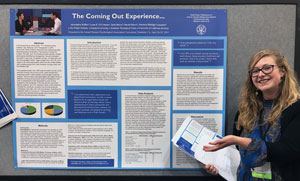
Alexandra Keller, PsyD Presents on "The Coming Out Experience"

Wright Institute Clinical Psychology Program graduate Alexandra Keller, PsyD presented her study, "The Coming Out Experience…" at the annual Western Psychological Association (WPA) Convention in Pasadena, California on April 26th. Alongside four co-presenters - Wright Institute Clinical Psychology faculty member Lynn O'Connor, PhD, Samford University professor Jack Berry, UC Berkeley student Patricia Hidalgo-Gonzalez, and Graduate Theological Union researcher David Stiver - Keller presented the findings of a survey that aimed to determine why members of the LGBT community may avoid disclosing sexual orientation or gender identity. "Is it because of an internal discomfort at their own identity," Keller asks, "or is it because it is not yet safe to come out?"
In an anonymous online survey, 171 individuals from around the world who identify as members of the LGBT community were invited to complete two questionnaires to describe their experiences after "coming out." Respondents completed revised versions of the LGBT Discrimination Survey (LDS) and the Coming Out Survey (COS), as well as additional open-ended questions.
After compiling the survey data, Keller and her team conducted a correlational research analysis to determine whether a respondent's difficulty coming out or discrimination faced after coming out were associated with their interpersonal guilt and satisfaction with life. They found that those who faced difficulty coming out typically also experienced discrimination after coming out, and that those who faced discrimination tended to have lower levels of life satisfaction.
The research team discovered a strong correlation between survivor's guilt and both discrimination and difficulty coming out. They also found that respondents who described their families as "politically conservative" faced greater discrimination and difficulty disclosing their sexual orientation. Overall, 47% of survey respondents reported facing hostile verbal reactions upon coming out, and 45% described facing physical violence.
Some of the narrative responses to the survey were haunting. Many noted the intersections of racial and gender discrimination in conjunction with coming out, and many respondents described the violence and fear of violence they experienced. "I had to be careful. I had to hide and mask my emotions. I played dead," wrote one respondent. "I was beaten and harassed at school," wrote another. A third respondent expressed fear at the thought of their grandparents learning about their sexual identity. "The frequency at which the survey's participants faced physical and verbal threats," writes Keller, "make it clear why many people still hesitate to discuss sexual orientation."
"I believe Keller's study makes an important contribution to our understanding of when and why people are able to self-disclose sexual orientation, and when they decide it is wiser to conceal this personal information," says O'Connor, who served as a faculty advisor for the study. When working with clients, "political problems may appear to be personal, and maintaining a psychological perspective may inadvertently hide important political forces driving human behavior. This study reminds us to keep our eyes open to external political realities."
"The suggestion that coming out indicates good mental health and that failure to self-disclose indicates psychopathology represents a denial of the external homophobia still maintained in our culture," the study concludes. Unfortunately, the high incidence of threats of violence against members of the LGBT community shows that homophobia is still widespread.
The results of the survey may seem bleak, but Keller maintains hope that members of the LGBT community will soon be able to safely express themselves openly without fear of retribution. Citing the importance of the coming out experience to members of the LGBT community, the study points to presidential candidate Pete Buttigieg and his recent interview with MSNBC's Rachel Maddow. If a major presidential candidate and a well-known news anchor can freely discuss their coming out experiences, perhaps there is some hope on the horizon.
The Western Psychological Association (WPA) was founded in 1921, and its April convention in Pasadena was the 99th annual. The WPA's 100th annual convention will take place April 30-May 3, 2020, in San Francisco.
Learn more about the Wright Institute's Master of Counseling Psychology program.
Learn more about the Wright Institute's Doctor of Clinical Psychology (Psy.D.) program.
